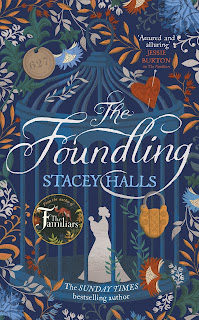WHEN Rossendale-born Stacey Halls’ historical novel,
The Familiars, was published last year, she could have only dreamed that it would be a widely acclaimed bestseller, see the TV rights sold to a production company, and earn a nomination for a top writing award.
The Familiars, was published last year, she could have only dreamed that it would be a widely acclaimed bestseller, see the TV rights sold to a production company, and earn a nomination for a top writing award.
It was a tantalisingly beautiful and highly-charged tale set
amidst the dangers of the 17th century witch trials at Lancaster
Castle, blending real local history with an inspirational flight of fancy to
imagine the dilemma of two young women caught up in a menacing maelstrom of
suspicion and witchcraft.
One year later, it certainly can’t be said that 30-year-old
Halls – who studied journalism at the University of Central Lancashire in
Preston – has been resting on her laurels, with her second novel hitting the
shelves and already causing a stir.
 |
| MULTI-LAYERED MYSTERY: Author Stacey Halls |
The Foundling, a powerful and emotional tale about
motherhood, class, love, lies and hope, set on the grimy, chaotic and colourful
streets of Georgian London, is another visually breathtaking, richly detailed,
and character-driven story stuffed full of nuggets of real social history, and
complex maternal and feminist insight.
At the heart of the story is London’s now-demolished
charitable Foundling Hospital, which was established in 1739 by the
philanthropist Thomas Coram to care for babies whose parents could not look
after them.
Weaving a compelling mystery about a newborn girl left at
the hospital by a teenage unmarried mother, Halls sweeps us into the lives of a
fascinating cast of diverse characters from both sides of the social divide,
whilst asking searching questions about what it means to be a woman, and a
mother.
Life has never been easy for 18-year-old fish market hawker
Bess Bright. She still suffers the loss of her mother when she was only eight
and lives in a cramped two-room tenement in the shadow of the Fleet prison with
her father Abe, who has a shrimp stall at the nearby Billingsgate wharf, and
her older brother Ned, who is a crossing sweeper.
But as she leaves her home in November of 1747 and heads to
the Foundling Hospital, she faces the terrible ordeal of handing over her
illegitimate daughter Clara. Even though the infant was delivered only hours
ago, Bess already knows her as well as herself, and the only other alternative
is to ‘leave her on a doorstep for the rats.’
Click HERE for Lancashire Post review
Click HERE for Lancashire Post review
Each baby is recorded with a number and the mother’s
personal ‘identifier,’ often just a strip of material but in Bess’s case, half
of a whale bone shaped into a heart, with the other half belonging to the
child’s father. The hospital is always open to a parent reclaiming a child
when they have raised enough to ‘buy’ them back and Bess vows to save all the
money she can to one day return to take back her precious daughter.
Six years later, Bess goes back to the Foundling to reclaim
the child she has never known. She is dreading discovering that Clara has died
in care but is shocked to learn that her daughter was reclaimed by a woman, saying
she was Bess, just 24 hours after the baby was left.
With her life turned upside down, Bess is determined to find
out who has taken her little girl… and why.
Less than a mile from Bess’s lodgings in the city, in a
quiet, gloomy townhouse on the edge of London, a young, troubled widow lives a
sad and cloistered existence ‘to stay safe’ with her daughter Charlotte, and has
not left the house in a decade. When her close friend, Elliott Mead, an ambitious
young doctor at the Foundling Hospital, persuades her to hire a nursemaid for the child, she is hesitant to welcome someone new into her home and her life. But her past is threatening to catch up with her… and to tear apart a world that has been so carefully constructed.
young doctor at the Foundling Hospital, persuades her to hire a nursemaid for the child, she is hesitant to welcome someone new into her home and her life. But her past is threatening to catch up with her… and to tear apart a world that has been so carefully constructed.
After a debut that stepped fearlessly into the centre of
some of Lancashire’s most disturbing and brutal history, Halls has found a firm
footing amongst the brash, bustling stalls of London’s old Billingsgate fish
market, the capital’s damp, dank, stinking tenements, and the neat, soulless
rows of Bloomsbury townhouses.
With a gripping sense of 18th century time and place,
vividly portrayed characters who stay in the mind long after the last page has
turned, and a clever, fast-moving, dual narrative which allows readers to
understand both sides of a multi-layered mystery, this is captivating,
compelling storytelling.
Beneath Halls’ exploration of broken hearts, poverty,
struggle, survival and the torment of mental illness, there is a slow
unravelling of secrets… and a young child who desperately needs to be loved.
From ‘sleep-soaked wives’ queueing for early morning bread,
shrieking fishwives hawking their wares, and the scent of coffee houses filling
the air, to women with wigs piled high with plaits and lace, and vicious,
volatile gambling dens, Halls paints a dazzling and memorable portrait of
Georgian London. Where next for this exciting young author?
(Manilla Press, hardback, £12.99)

No comments:
Post a Comment